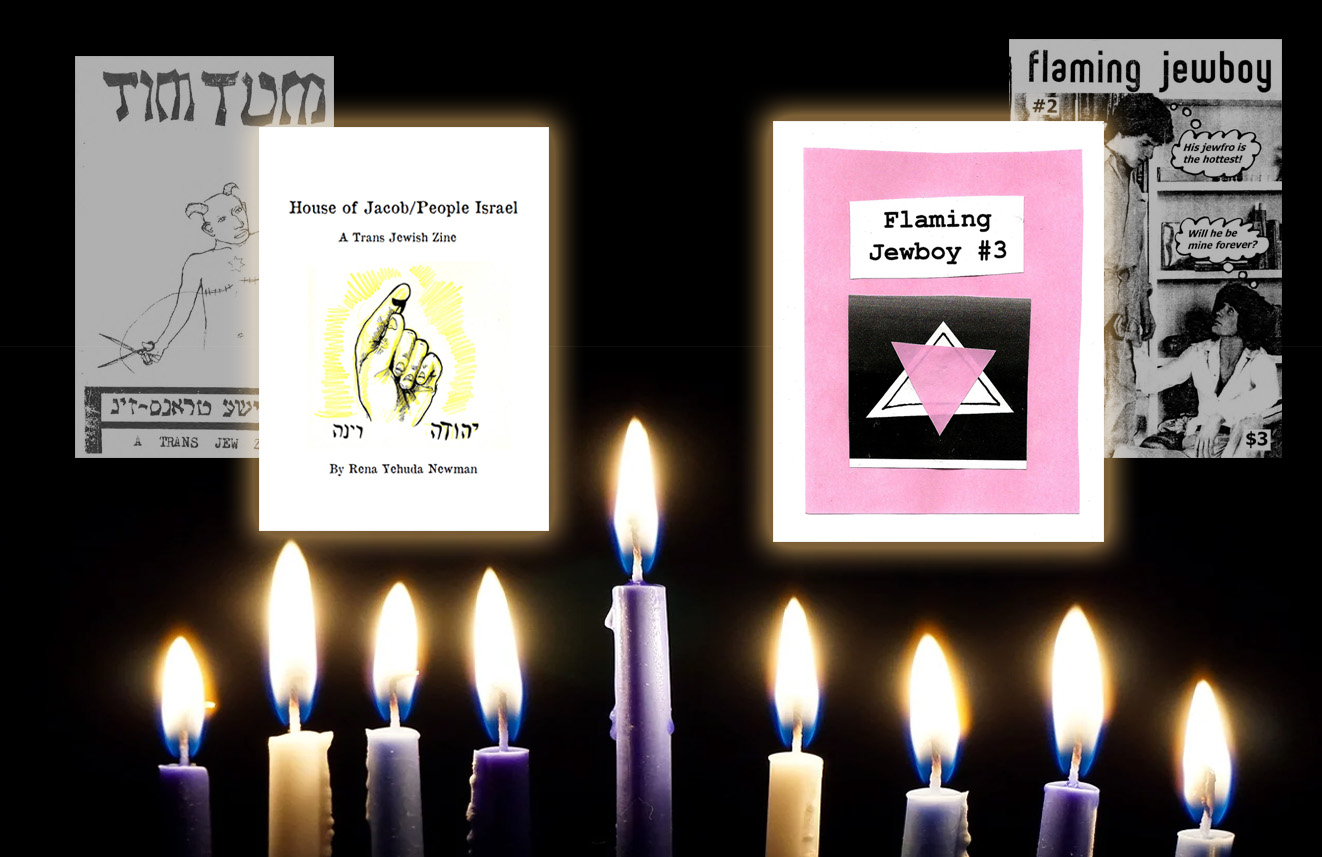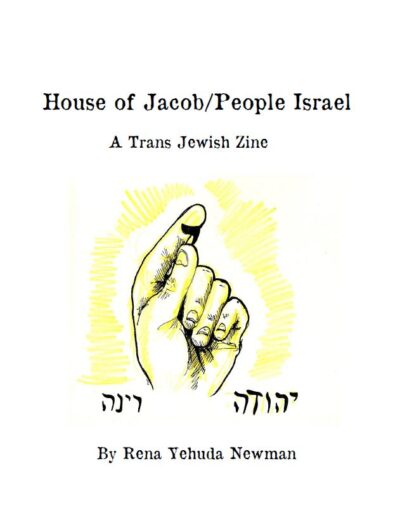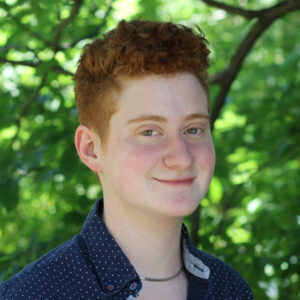Zines are a lot like Torah: passed down from generation to generation, with each text inspiring more texts, more commentaries, more sparks, more light.
Jewish Zines are like Torah in another way: only you can reveal what comes next.
Earlier this week, as part of the Eight Nights of Jewish Zines series, I published an essay entitled “A Love Letter to ‘Timtum: A Trans Jew Zine'”. There, I wrote how “Timtum” by Micah Bazant had moved and changed me, broke me open and brought me to the understanding that the braids of my identity were interwoven. There is a lineage to Jewish zines these days, and I can say with certainty that receiving the l’dor v’dor of Jewish zines and a particularly DIY-style of yiddishkeit ultimately lead me to create my own: “House of Jacob // People Israel” and “Flaming Jewboy #3“.
For me, the notion of lineage informs my Jewish zinemaking. “House of Jacob // People Israel” was a direct response to Micah Bazant’s “Timtum” zine, exploring Jewish gender for myself. I wrote this zine at the end of my freshman year at UW-Madison in 2016, with my tears on the page. I felt that I needed to pay the favor forward and add to the growing genre of Jewish gender-fuckery from the rawest part of me, hoping to encourage others to do the same.
So too with “Flaming Jewboy #3”, a tribute to the earlier “Flaming Jewboy #2” by Avram Katzman, a zine that remarkably made it into the Queer Zine Archive Project (QZAP). It survived the passage of decades to land in my lap like a message in a bottle, sent by queer Jewish forebearers who are, blessedly, still alive. I began writing my zine after reading the essay in “Flaming Jewboy #2” entitled “Brains and Bodies”. Katzman’s essay begins with the line:
“I’ve almost never done it with a queer Jew…I figure it’s enough that I’m a Jew. Who needs two of us?”
Katzman’s essay introduced me to the word Jewfag, a brutal word that has become like an amulet. Katzman’s work was explicit and intense, talked about internalized antisemitism 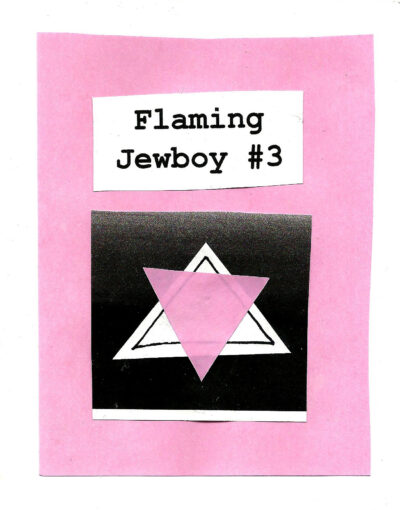
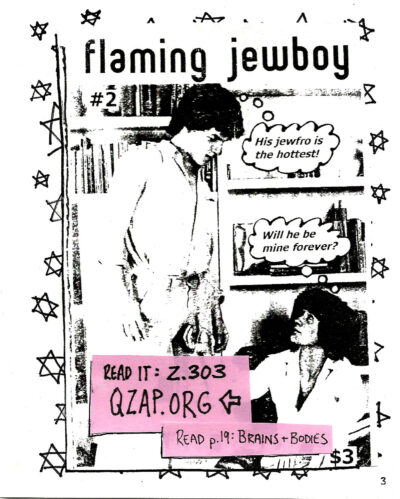
printed out the essay in Courier font, folded some printer paper and, with scissors and gluestick in hand, scanner at the ready, began to compile “Flaming Jewboy #3”, not knowing if the title had already been used, hoping to honor the Torah that Katzman brought into the world before me. I published it because I had read a story I needed, but it wasn’t enough. I needed even more: stories that I’d written, but especially the stories that are about to be written.
It may be genuinely self-aggrandizing to finish a Hanukka of Jewish zine features with my own work, but I do this less to plug my own productions than to underscore that the canon of Jewish zines is growing as we speak, with wide space beckoning for more and more Jews to share their stories in this underground and potent medium. You too could be among this generation of Jewish zinemakers. All it takes is the decision to make and share your zine. There are no gatekeepers here, only open terrain.
The two zines that I’m bringing for the 8th night of Hanukka are both zines that I made when I didn’t know where else to turn. My stories were fragmented but ready, and I poured them into collaged, stapled pages. I’d figure out the rest later, I told myself. Under the hot light of my desk lamp, I sorted through old notebooks and worked my keyboard to tell stories that explained how “the magic in my queerness is my Judaism and the magic in my Judaism is my queerness”, a quote from my dear friend Efrat, whose wisdom has influenced my zines over the years.
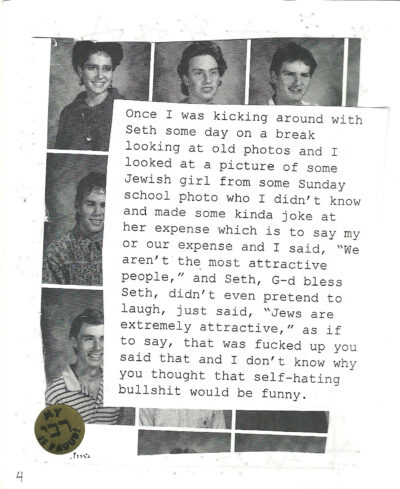
I became part of the zine world because I had stories that needed sharing, but those stories were too personal, too strange and sacred. I didn’t know how to tell them with the self-certainty that comes with Editorials or formal articles published in institutional magazines. In fact, it wasn’t just that these stories didn’t fit the publications; I didn’t want the readers of those publications to see my story. At least, not like this — not so unpolished and raw, like a thought conjured in a deep conversation late at night with a friend, where you’re saying something that matters to you aloud for the first time and it feels true, but you only said it because you know the person listening will understand what you mean, will grasp the holiness behind the sentiment.
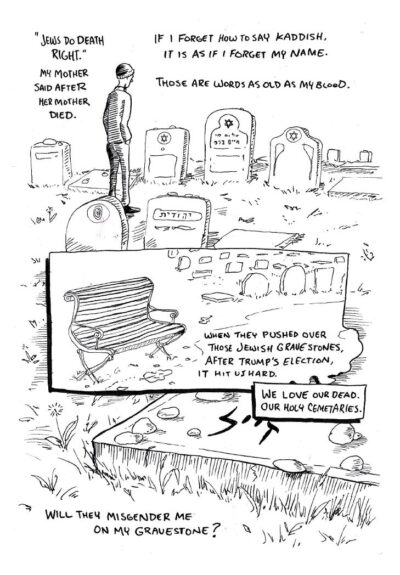
Zines continue to be one of the few existing mediums that open that possibility. Nobody reads a zine unless they really want to know what’s inside; they’re too obscure for real critique, the stakes aren’t high enough for it to matter — which is exactly why it matters. A zine audience will always be empathetic, meeting you with kind eyes.
This is why most Jewish zines are written by those of us who feel that we live on the edges of the communal camp; queer and trans Jews, anarchist Jews, anti-Zionist or non-Zionist Jews, Jews who have been told that our stories couldn’t matter to the broader community. Often, it feels that we are the only ones who will have us. So we turn to zines rather than seeking publication in Tablet Magazine or the Forward; as Jewish zinemakers, we whisper our own tehillim into saddle-stitched booklets, praying that it’ll get to where it needs to go and that the hands who will open these pages will be attached to a friendly heart.
It is a true pleasure to publish the work of Jewish writers in my capacity as Editor of New Voices, but the real joy of this job is the opportunity I have each day to tell young Jewish creators that their stories matter enough to be written. I’ve chosen zines as New Voices Magazine’s focus this Hanukka because of their unique capacity to bring light into the darkest parts of our emotional worlds, just as the menorah’s candles do each night of the holiday.
I hope that those young Jewish creators reading along with our Eight Nights of Jewish Zines have not only enjoyed the features, but experienced a call to action. Lech l’cha, go forth and make the zines about those things that matter most to you, that you wish existed in the world in your loneliest moments. You do not need an editor or even a budget. Your stories are Torah and there are generations of young Jews who need them, waiting for their light.
You can buy digital copies of New Voices Editor Rena Yehuda Newman’s zines here. Read more about Jewish zines and find the other Hanukkah Jewish zine features by visiting our holiday landing page here.
